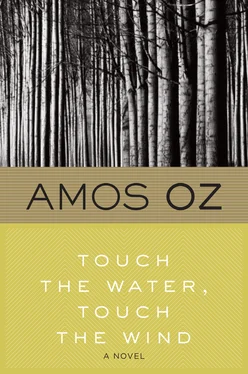The military governor of the town, a certain Baron Joachim von Topf, issued an edict: the army was compelled to requisition the Gymnasium buildings. For the time being all classes were canceled. The Baron saw fit to append to the edict a word of apology to the citizens: the hardships of wartime would soon be over, and before long a new order would be established.
But the difficulties increased. The streetcars stopped running, prices soared, and the ancient belfry of St. Stephen's Church — an architectural gem in Florentine style — was damaged by a stray bomb. Nightly the sound of bricks was heard clattering in the ruined church. Sometimes the falling bricks struck the bell at night, giving rise to numerous superstitious rumors. Even in the circles of the Catholic intelligentsia the view was expressed that everything was possible.
Various people, including some eminent citizens, abandoned the city. In the middle of Jaroslaw Avenue stood a burned-out streetcar, and a chestnut tree lay uprooted for several weeks. Professor Zaicek several times complained to intimate friends of an acute inflammation of the bladder. Grim and even wild rumors spread: women in the marketplace said that poor Jews, or priests, or perhaps only consumptives, were being transferred elsewhere by the authorities. The rumors were virtually impossible to trace, verify, or substantiate. In back alleys petty speculators proliferated nauseatingly. Even the library was temporarily closed.
Stefa was smitten by a secret disappointment. The war, for all its horrors and its vulgarity, had offered a certain possibility of rejuvenating Europe, of refreshing worn-out ideas, and of being a participating observer of a mighty historical event, but in fact on all sides there was nothing but drabness and pettiness. One night some drunken soldiers smashed the historic stained-glass windows of the Concert Hall. The statue of Adam Mickiewicz was defaced with a thin mustache which bore a remarkable resemblance to that of the vanished teacher of physics and mathematics; unruly soldiers, or schoolboys who had run riot in the night. On the corner of Magdalen Lane a Swabian corporal addressed Stefa in such illiterate German that she was appalled. Suddenly it dawned: time was running out. Stefa had never been very strong; she suffered from migraines in the morning.
Worst of all, postal communications with the outside world were rapidly deteriorating. The old stamps were withdrawn from circulation. Pianos were requisitioned from several houses. The new order tarried in coming. Over all, with sly tranquillity, the bear's glass eyes looked down. And from the grocers' shops Portuguese sardines vanished as if they had never existed.
Early in 1940, with the first breaths of a bizarrely out-of-place spring, Pomeranz sallied forth from the hut in which he had hidden all through the winter and began to move from place to place. He assumed by turns the various garbs of herdsman and railwayman, peasant and priest. Gently, pensively, he glided south, southwest, and south again, a slow, almost bashful caressing movement across the dense forests. When the hunt was near he hid all day in barns on the outskirts of Godforsaken villages. At the onset of dusk he would leave his hiding-place and stand lean and erect in the darkness until he was cloaked in night, and then he would play softly on a mouth organ. The Polish air was instantly saturated with music. Pomeranz pawed the muddy ground, gathered an inner momentum, belched, sweated, leaned his elbows on the music he had discharged round about him, flailed with his arms, struggled and pulled, got the wind behind him, and finally uttered a soft grunt and wrenched himself free from the grip of gravity.
He rose and floated on the dark air, his body slack after the effort, borne high and silent over woods and meadows, over churches, huts, and fields.
So he overcame all the obstacles in his way.
He had once learned, perhaps from his wife, that time is subjective, an affection of the mind. And so he had a low opinion of it.
Even material objects, if you plumb their depths, are no more than vague images. In brief: ideas cannot be perceived, and perceptible objects can never be grasped by thought.
Ergo, nothing exists.
Germans, forests, huts, ghosts, wolves, dawn-stench of villages, haystacks, vampires, muddy streams, snowy expanses, all seemed to him a clumsy, ephemeral convergence of abstract energies. Even his own body appeared to him to be a willful tide of transient energy.
As he passed his frostbitten fingers across his brow he suddenly seemed to touch a star. Or as he clasped his frozen legs together in the snow in the forest at night he seemed to be struggling to reconcile two opposing ideas. He learned to devour whole marrows and pumpkins and follow them with raw mushrooms.
Yet he spared the music, and for the time being refrained from reducing it to its mathematical structure. He was saving this possibility for a moment of despair, a last resort, an ultimate weapon. In the same way he dispelled the memory of his wife and his home: longing was a poisoned snare, a lethal dart. Throughout his journey he kept in his pocket a little mouth organ. He could rise in the air, soar high into the night, even discard his body, by means of a change of tune. And into his worn red boots he stuffed sackcloth against the biting cold.
Solitude and wandering trained this educated Jew to eat raw potatoes, to quench his thirst with handfuls of snow, to mislead the noses of old wolves, to plant his footprints backward in the snow to baffle all pursuit. He had the power of feeling his way, using his thoughts like radar beams, through the tangled network of forest paths. So he eluded the German guards and bands of partisans, avoided minefields and trip wires, made his circuitous way along the valleys among hostile villages, untouched by foxes, vampires, or villagers with axes. And in his tattered sleeve he carried a grubby certificate of baptism in the name of Dziobak Przywolski, son of Mary.
If suffering got the better of him, he would forget his pride and emerge at dusk from the forest darkness, aided by the long shadows and deceptive twilight, scare a solitary peasant woman and plunder a goose or some eggs or a woolen kerchief. These forest regions, cursed by damp and darkness, were unloving and unloved. Closing in on all sides, offering no escape. So he passed on from darkness to darkness as if he too were cloaked in darkness.
Days and nights passed, and his foot became painfully inflamed. Melancholy overcame him, or perhaps for a moment he was carried away by longing. In one of the caves he lost his seven-league boots, or his hood of invisibility fell apart. In short, the music died away and the dreamy son of a watchmaker grew weaker and weaker until he was captured by a German patrol.
A lame, rotund major with rimless spectacles took the certificate of baptism from the prisoner and studied it so thoroughly that the writing grew faint. Then he raised a single, narrow eyebrow and ordered the short Son of Mary to be taken to the cells: the brow, the vicious eyes, the heavy jaws, his smell, and that insolent mustache, the expression of a spy in a comic film, and on top of it all the torn robe of an itinerant priest, everything about him was obviously suspicious. Furthermore, the boredom and the fleas were playing havoc with the major and his men.
The cell was nothing more than the filthy cellar of an abandoned monastery or seminary: crosses and obscene drawings covered the walls. And the cold was piercing and tormenting.
Pomeranz suddenly recalled a conversation which had taken place years before. Stefa had taken him to the Philosophical Soirée of the Goethe Society. The intelligentsia of the town of M — were involved in a discussion of political vis-à-vis metaphysical wrong. Bright, bespectacled young men, all of them thin, gazed covertly at Stefa's legs, then at her plain, silent husband, and back again at her long-lashed eyes. Dream-stricken Stefa. When the first exchange of witticisms had died down, Professor Zaicek spoke about conflicting ideas and their universal tendency to circularity. His Karl Marx face silently radiated, as always, an agonized wisdom, and his voice when he spoke was tender and tired. Eventually they drank tea and nibbled cakes, and in the small hours of the morning they beguiled Stefa into playing some sad études, while they all gazed at her waist with moist eyes.
Читать дальше

![Хироми Каваками - Strange Weather in Tokyo [= The Briefcase]](/books/29150/hiromi-kavakami-strange-weather-in-tokyo-the-br-thumb.webp)










